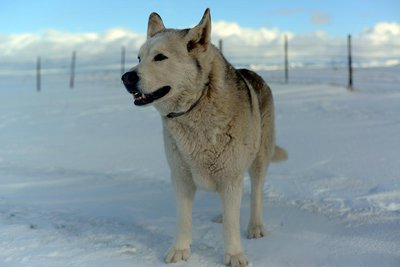
“You are unique. You want a unique pet. Everyone has German shepherd or Lab puppies for sale but that’s not You. You are amazing and You want a amazing pet. You want people to stop You wherever you go to ask about your animal.”
So reads an online advertisement claiming to sell wolfdog puppies (“GIANTS AVAILABLE!”), though most of the photos look like Siberian husky pups, and a few might have been mixed with a little something else. The ad goes on to announce timber wolf and Canadian Eskimo wolf mixes, yet is woefully silent about any sort of buyer information addressing the complexity of the pet it peddles.
Wolf-dog hybrids, aka wolfdogs, are known in the dog-breeding community for a number of things: the enigmatic nature of their heritage, their high maintenance levels and their high rate of abandonment.
Qualities that owners often look for in dogs such as ease of training and guarding abilities are generally not found in wolfdogs; these behavior traits are governed by their undomesticated wolf habits. This can make for a large pet that is difficult to train and is often shy toward people and aggressive toward other pets.
Despite the high rate of abandoned wolfdogs and inexperienced owners, reputable and shady breeders alike continue to raise and market wolfdogs.
“They’re very independent, they remind me a lot of cats in that they don’t care if they please you; if they feel like coming to you, they will,” says Kim Kahl of Wolf Angel Rescue, based in Bend. Kahl has been working with wolfdog rescues around the U.S. since 2000 to find homes for abandoned wolfdogs as well as taking care of her own rescued wolfdogs. Her current wolfdog is upper-mid-content, which she approximates to be around 65 percent wolf, meaning that he looks and acts very wolfy.
Kahl says that most of the rescues she works with are at full capacity, and that because wolfdogs need special attention, they can’t go to a humane society since they may be unsocialized depending on their previous conditions, or they may easily escape their pens and be too aggressive toward smaller animals.
Hybrid wolfdogs are legal to own in Oregon, but are sometimes regulated or prohibited at the local level. The Oregon Department of Fish and Wildlife’s 2010 “Oregon Wolf Conservation and Management Plan” says that “because wolf hybrids can be difficult to distinguish from wild wolves, negative encounters between humans and hybrids often are attributed to wild wolves.”
Brooks Fahy of Eugene-based Predator Defense says humane societies that receive wolfdogs often have to euthanize them rather than give them the special care they need.
“It’s about money. People aren’t breeding [wolfdogs] because they make great pets,” Fahy says. “It’s all about image; it’s all about persona and having something wild. And for me, if you really love wolves, you then understand that we’re not supposed to own them. They’re supposed to be wild.”
Fahy says many of the wolfdog owners that he knows “just sort of ended up with them,” in that they rescued them or found them after they had been abandoned by owners who couldn’t handle the attention required. “Wild animals aren’t meant to train. We’re not supposed to be making pets out of wild animals, much less breeding wild animals with domestic animals. It’s something that I highly recommend against,” Fahy says.
Kahl says that there is a lot of misinformation about what to expect from a wolfdog, as well as within the breeding system. “Backyard breeders,” as she refers to them, often randomly mix malamutes, German shepherd and Siberian huskies, and then sell them as wolfdogs. They are measured in terms of content, meaning how much wolf is in them. A low content means more dog-like characteristics and a high content means more wolf-like characteristics, both physically and behaviorally. One issue is unknown content levels, especially from the time the wolfdog is a puppy to the time it is full grown and its wolf-like behaviors are in full swing. Buyers are often swayed by the idea of owning a majestic wolf, without doing full research or finding the right wolfdog for them.
“I think that a lot of what’s going on is a total lack of education among the general public about wolfdogs,” Kahl says. “It’s a mystique, you know; ‘the wolf’ is kind of a spiritual, mysterious creature that really appeals to the imaginations of people. But there’s a lot more to it than that. And people need to understand that not everybody can have a dog that has wolf in it.”
To make sure people are fully prepared for the responsibilities that come with a wolfdog, Kahl recommends that people visit or volunteer at a sanctuary first in order to get to know the needs of a wolfdog, as well as research other components like proper enclosures, diets, ethical and unethical breeders, and gaining an understanding of content levels.
Kahl says that many friends of hers have had deep, meaningful relationships with wolfdogs, including one of her own. “He was my best, best friend, my soul mate,” Kahl says. “But they’re not for everybody; I guess that’s the bottom line.”
Wolfdog Rescues and Sanctuaries
Songdog Rescue, Inc
Ashland, OR • skyewolf@songdogrescue.com
White Wolf Sanctuary
Tidewater, OR • (541) 528-3588
Wolf Haven International
Tenino, WA • (360) 264-4695
Lockwood Animal Rescue Center
Frazier Park, CA • info@lockwoodarc.org